Completed your proxy yet?
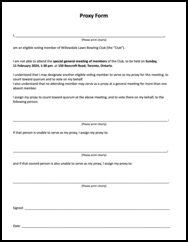
The meeting is being called to formalize our incorporation process. Being incorporated provides the club with a level of risk prevention. But the main reason for incorporating is to access larger capital grants that are only available to community organizations that are incorporated.
Notices for the special general meeting have gone out to members with a package of materials that will (ideally) be read by all members before the start of the meeting. If you haven’t received a package (or can’t find it), please consult the list below. You can click on each document to access it prior to the meeting.
- A cover letter from Suzan Tari, President of the club, giving a brief explanation of reasons for incorporating
- Notice of the special meeting, which includes the text of a Resolution that you will be asked to consider and vote on at the meeting
- Schedule A: Form 4001 - Articles of Incorporation,
- Schedule B: Form 4002 - Initial Registered Office Address and First Board of Directors, and
- Schedule C: By-law No. 1;
- A Proxy Form for members who won't be at the meeting; and
- A list of the club's assets (for information purposes only).
As a reminder, each member can only bring one proxy to the meeting, which is why you are asked to make up to three choices for your proxy on the form.
Special General Meeting
Sunday, Feb 11
1:30 to 3:00 p.m.
As a result of that process, the board of directors is calling a special meeting of members on Sunday, February 11, 2024, from 1:30 p.m. to 3:00 p.m.
Member resolutions need to be passed in order to meet the legal requirements of incorporating a not-for-profit association like ours. If those resolutions are passed and the paper work is filed before March 1, 2024, Willowdale Lawn Bowling Club will be eligible to apply for large Trillium Foundation grants as early as next year.
We need those grants to make the capital investments that will keep our club vibrant and thriving. One of our first applications, for example, is intended to be nearly $200,000 to resurface the artificial green.
Please join us in person, or let us know if you’d like to attend via telephone or other electronic means.
It’s critical that we have a quorum at the start of the meeting to get the resolutions passed to meet all necessary legal requirements.
Proxies are possible
If you’re unable to attend the February 11 meeting, please take the time to assign your proxy to another member.
If you’re accepting a proxy, please be aware that each voting member is only allowed to bring one proxy to the meeting.
Please attend in person, via electronic means, or click on this link to assign your proxy to another member.
See you (or your proxy) on February 11!
Motion passes
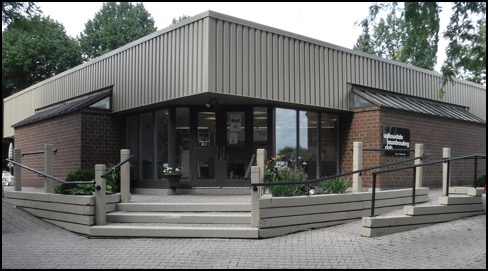
With input from a number of members, but most particularly Don Rayko and Jane Brackley, the following motion was voted upon:
The membership of the Willowdale Lawn Bowling Club expresses its openness to negotiating the following with the City of Toronto:
- Conversion of the centre green from natural grass to an artificial lawn bowling surface;
- Rejuvenation of the existing lawn bowling artificial surface on the south green;
- Conversion of the north green to alternative recreational uses, such as pickleball; and
- Use of the clubhouse as a warming centre during winter months by the City of Toronto.
The motion was carried and the board of directors is already working on developing the next stage of the club.
The future of Willowdale Lawn Bowling Club: Pickleball anyone?

During a spirited discussion, the point was made that, like any recreational infrastructure in Toronto today, Willowdale Lawn Bowling Club faces two challenges.
The first is what’s being called an “infrastructure deficit.” Much of the City of Toronto's aging infrastructure (not just recreational infrastructure) is showing its age, to the point that some estimates suggest that approximately $10 billion is needed to bring the city’s aging infrastructure up to a state of good repair.
That creates significant competition for a finite pool of capital.
The second is that any investment in recreational infrastructure will go first to multi-use facilities—i.e. those facilities that can support multiple uses for different forms of recreation—before being allocated to single-use facilities.
One of the ideas floated during the meeting is turning the north green into pickleball courts. We would still maintain lawn bowling on the centre green and the artificial surface, but we would become a multi-use facility.
“We have to be flexible in our thinking,” says Suzan Tari, vice-president of Willowdale LBC. “The pickleball option could provide us with long-term stability. With that, we can focus on growing the sport of lawn bowling in Willowdale and potentially across Toronto.”
Hurdles to overcome
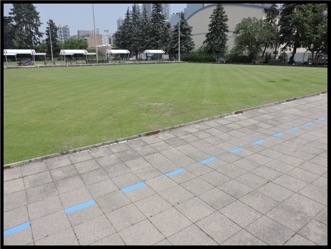
One of the most important is the lease under which the property currently operates. There are sixty years left in the ninety-nine-year lease between the City of Toronto and Mount Pleasant Group, which owns the land. The lease states that the only use for the property at 150 Beecroft Road is as a non-profit lawn bowling club and that such usage will be “continuous and uninterrupted except for maintenance, repairs and climactic conditions” until July 25, 2083.
The lease is currently being examined by the City of Toronto’s legal department with the potential intent of opening up negotiations to increase the uses for the property. This process started earlier this year when it was suggested that the clubhouse could serve as a warming centre during winter months.
“When the councillor’s office approached us with the idea of using the clubhouse as a warming centre, we were happy to support the community, but we immediately pointed out that such use is not allowed under the current lease,” says Eric Bergman, property manager of Willowdale LBC.
When Councillor Cheng visited the club for the first time on May 13 of this year, the board of directors asked to be included in any future lease negotiations. At the most recent meeting, she assured the board that she did contact the city’s legal department to have the club included, but since the lease agreement is between the city and Mount Pleasant Group—even with Willowdale Lawn Bowling Club specifically named in the lease as the sole sub-lessee for ninety-nine years—Councillor Cheng was informed that only city and cemetery representatives will be present at negotiations.
“We’re grateful to Councillor Cheng for trying on our behalf,” Bergman says. “Our concern is that unpalatable options will be presented to us if we are not at least consulted during negotiations. Our message is simple. We will be carefully monitoring any developments through the lens of what’s in the best interests of our members and the sport they enjoy. If necessary, we will help all parties understand the places in which we feel those interests are not being met.”
Artificial vs natural surface
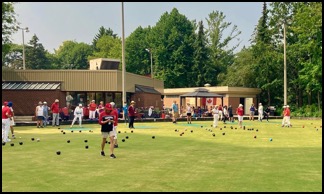
The centre green is a natural grass surface that requires almost constant care and attention.
Converting the centre green to an artificial surface would reduce the maintenance required. This would decrease the club’s reliance on volunteer resources, city assistance, and/or the revenue needed (between fifteen and twenty-five thousand dollars per year) to outsource turf management.
“Moving to an all-artificial club is a big decision,” Bergman says. “However, with a natural green, there are two potential long-term solutions. Either the city commits to taking care of the green for the next sixty years or the club spends between fifteen and twenty-five thousand dollars per year to hire someone to take care of the green.
“Asking volunteers to do the job is not a sustainable solution.”
Information session Tuesday, July 25
The board of directors is conducting an information session at the clubhouse at 7 p.m. on Tuesday, July 25. Please join us to be brought up to date.
Special General Meeting on Tuesday, August 1
The board of directors is calling a special general meeting on Tuesday, August 1. Please join us. We need to achieve quorum so we vote on the long-term direction and health of the club.
OLBA forms Toronto Action Committee
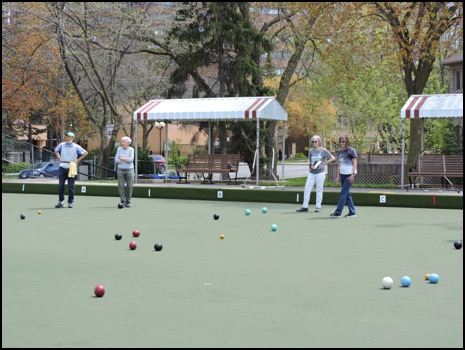
“We are quite concerned about the decrease in funding that occurred last year,” says James Rimmer, chair of OLBA’s marketing and sponsorship committee, who will also chair the action committee. “Our goal is to ensure the long-term viability of lawn bowling as a recreational activity in the City of Toronto.”
The committee held its inaugural meeting via videoconference on May 15, 2023. The first meeting was attended by representatives from Agincourt, Lawrence Park, Moore Park, West Toronto and Willowdale.
“We had good turnout to the first meeting,” says Rimmer. “But our expectation is that every lawn bowling club in Toronto will be represented as we get going. Regardless of whether a club is enjoying a good relationship with the city now, it’s In everyone’s best interest to work together.”
During the first meeting, clubs discussed the support they receive from the city and the challenges they currently face with greens, clubhouses and other infrastructure. Committee members also discussed the implications of Toronto’s Parks and Recreation Facilities Master Plan 2019-2038, released in 2017. While the plan says “there is no demonstrated need for additional lawn bowling greens during the timeframe of this plan,” it’s important to note that the report does not suggest withdrawing support from the lawn bowling community.
Committee members also discussed the importance of recreational activities for everyone and the value that social interaction provides to the community.
“Numerous research studies have shown that social interaction as we age improves quality of life on a number of levels,” says Dennis Bedeau, president of Agincourt Lawn Bowling Club. “But limiting lawn bowling limits that interaction. Without infrastructure, we have no lawn bowling. And we cannot maintain that infrastructure without the city’s commitment and direct support.”
The committee plans to meet every two to three weeks over the summer months.
If you would like your club to participate, please complete the contact form that will go directly to chair James Rimmer.
Subscribe to our newsletter
The Green Scene
And keep up with what’s
happening at our club
Toronto reduces lawn bowling support by 30%
During the fall of 2021, Willowdale’s board of directors made a freedom of information request that sought “Budget submissions by Golf Course operations for lawn bowling. Specifically, (we’re) looking for budgets approved by council that show line items to provide services to lawn bowling.”
The search yielded the following information:

The dates were chosen because 2016 was the year in which responsibility for managing natural lawn bowling greens was transferred to golf course operations. It was also the year after the national lawn bowling championships, co-hosted with Agincourt, were held on Willowdale’s greens.
“The city was responsible for managing our greens to championship status in 2015,” says Gordon Jones, president of Willowdale Lawn Bowling Club. “A lot has changed since 2016.”
Last. fall, another FOI request was made to update the information for 2022.
The request was initially denied, with the city writing:
“Staff of the Parks, Forestry and Recreation Division have advised that despite a thorough search, they were unable to locate any records responsive to your request. Access therefore cannot be granted to those records as they do not exist.
“Staff have further advised that the City does not have any lawn bowling greens located on golf courses.”
This was an interesting response, to say the least. However, after a quick e-mail exchange with the city clerk’s office, and the lawyer responsible for Willowdale’s FOI requests, Willowdale received the following:

From 2021 to 2022, staffing support decreased by 30 per cent. Materials and supplies decreased by three per cent (during year in which fertilizer costs rose more than 30 per cent). Pickup truck costs rose by 25 per cent during a year in which staff support decreased by 30 per cent.
The 2.4 greenskeeper positions
The 2.4 greenskeeper positions identified in the 2021 freedom of information request were not mentioned in the 2022 follow-up.
In theory, based on the number of operational lawn bowling greens in Toronto, and with 2.4 full-time positions shared by all clubs, each lawn bowling club with two greens should have more than one full-time person-day per week at its facility. That bears repeating: One full-time person-day per week at each club with two greens. Four to five full-time person-days per month. Twenty-five to thirty person-days per club per year.
In a follow-up request to the city clerk’s office, Willowdale asked:
“Since 2016, when responsibility for care and maintenance of lawn bowling greens was transferred to golf course operations, along with resources in the form of budget and greenskeeper positions, how many times have those 2.4 positions been filled with greenskeepers specifically dedicated to the care, maintenance and upkeep of lawn bowling greens in Toronto?”
The city replied:
“The 2.4 Greenskeeper positions dedicated to the care, maintenance and upkeep of lawn bowling greens in Toronto have been filled in full once in 2018.”
Canary in the coal mine
Is lawn bowling the canary in the coal mine of the city’s recreation portfolio? Possibly. Based on what’s occurring with lawn bowling, should other recreational groups be concerned? Absolutely.
Regardless of whether or not the lawn bowling canary is singing, however, two things are very clear when it comes to natural greens at lawn bowling clubs.
First, if you’re going to have natural greens, you need a dedicated core of volunteers to maintain them. Treat those volunteers like gold. Never complain about the work they do. Ever. And never forget that they’re always looking for help.
And that brings us to the second point. They can’t do it alone. They need your help. And they need the city’s help.
The trick will be to find ways to bring number one and number two together.
How can the city use volunteers to stretch its resources and its budget? And how can volunteers take advantage of the city’s knowledge, equipment and people to meet the challenge of maintaining recreational infrastructure of reasonable quality?
Those, folks, are the 233,296-dollar questions assuming, of course, that Toronto’s lawn bowling community regains the heady budget heights it enjoyed in 2021.
And they’re the same questions that every other recreational group in Toronto should be asking.
Board sets fees for 2023
The annual fee has risen to $180 from $165. However, all members are eligible to a free locker. They simply have to register their locker number.
Social memberships will continue to be $20 per year.